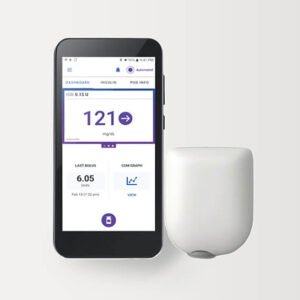Table of content
Stress – one reason behind a thousand problems.
Stress not only increases your blood sugar levels, but it also creates the problem of diabetes altogether if you don’t have it already.
When you are under stress, your body releases chemicals like adrenaline and cortisol. Your body secretes these for an energy boost so you can fight the problem. However, sometimes this energy is not properly consumed by the cells, so your sugar levels are increased.
Thus, stress can surely raise your sugar levels.
Effects of different types of stress on diabetes:
Stress has different effects on everyone. Sometimes, it can even impact one’s physical response.
If you have type 2 diabetes, your sugar levels will more likely rise due to stress. However, if you have type 1 diabetes, mixed responses can be expected; this means you can experience either an increase or decrease in your blood sugar levels.
How can you check if mental stress is impacting your sugar levels?
Tracking is the key here. If you are always stressed at a specific time or day, you can track your sugar levels during that particular time interval.
By doing this, you can determine if stress is causing some abnormalities. You may repeat this test several times to see an exact pattern.
In case your sugar levels are high all the time, probably this is due to your mental stress levels.
Do you know? With the help of a Continuous Glucose Monitoring device, you can easily track your sugar levels 24/7 without pricking your finger each time.
Signs of Stress:
Usually, we do not analyze whether a problem is caused by mental stress. We often forget that staying stressed does not resolve a problem but can surely affect us mentally and physically.
Recognize the symptoms and take small steps to manage your stress.
Signs from the body:
- Muscle pain
- Headache or sleeping too much
- Generally, not feeling well
- Fatigue
Other possible signs of stress:
- Anxious
- Restless
- Unmotivated
People who are stressed out may also indulge in unusual things:
- Eating a lot or not eating at all
- Angry mode
- Not ready to meet friends and family
- Using drugs
How do you reduce stress levels?
Reducing stress levels will not only allow you to manage your diabetes but will also save you from numerous other health conditions.
Here are a few things you can start right from today:
- Exercise – it’s crucial (at least walk 30 mins a day).
- Avoid stressful social situations.
- Limit your caffeine intake.
- Spend time with family/friends.
- Try doing some yoga.
What to do if my diabetic conditions are severe?
Follow your doctor’s advice and try these steps for added benefits;
- Cut off your Carbs as much as you can.
- Limit your sugar and potato intake.
- Go for a walk daily.
If you experience difficulty checking your glucose levels periodically, consider a CGM device. CGM Monitors has an inventory of the best CGM brands.
Conclusion:
Stress can affect you mentally and physically. It can increase your sugar levels as well. Some symptoms, like headaches or extra sleep, show you are stressed. Once determined, you can surely take some easy steps to manage your stress and live a happy life.
Frequently Asked Questions
Can stress develop diabetes if I do not have it already?
Yes, prolonged stress can develop diabetes. Please refer to the article for detailed answers.
What are the effects of stress on type 2 diabetes?
If you have type 2 diabetes, your sugar levels will more likely rise due to stress.
What are the effects of stress on type 1 diabetes?
You may expect mixed responses, which means you can experience an increase or decrease in your blood sugar levels.
Is headache a sign of stress?
Yes, headache is a sign of stress. Please refer to the article for detailed answers.
Is yoga good for releasing stress?
Yes, exercise is good for releasing stress, as well as yoga or tai chi.













Write a comment
Your email address will not be published. All fields are required